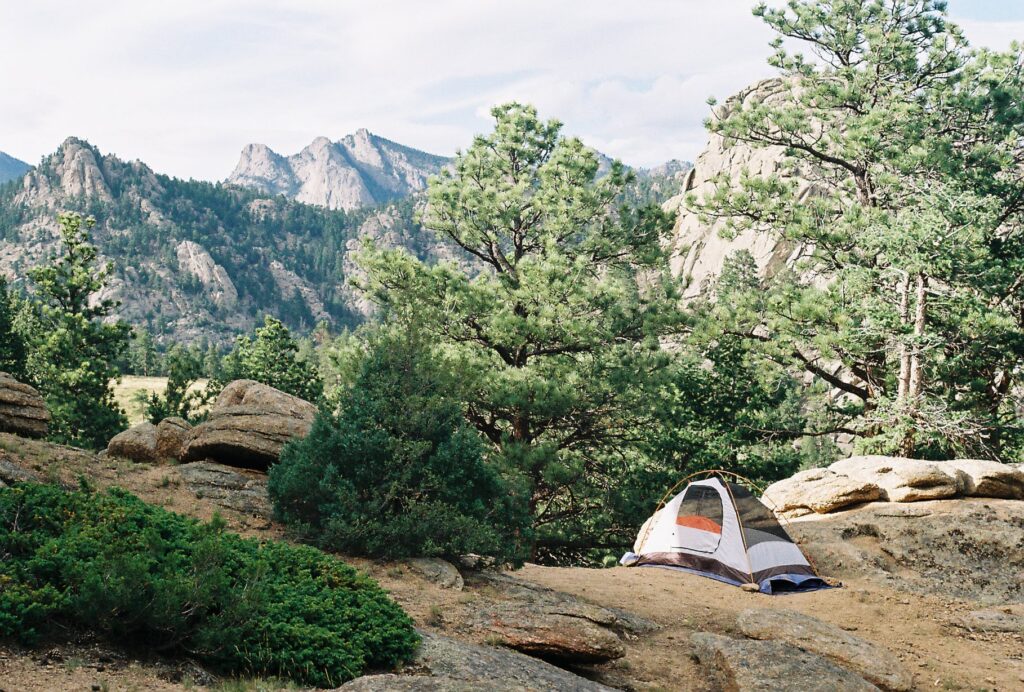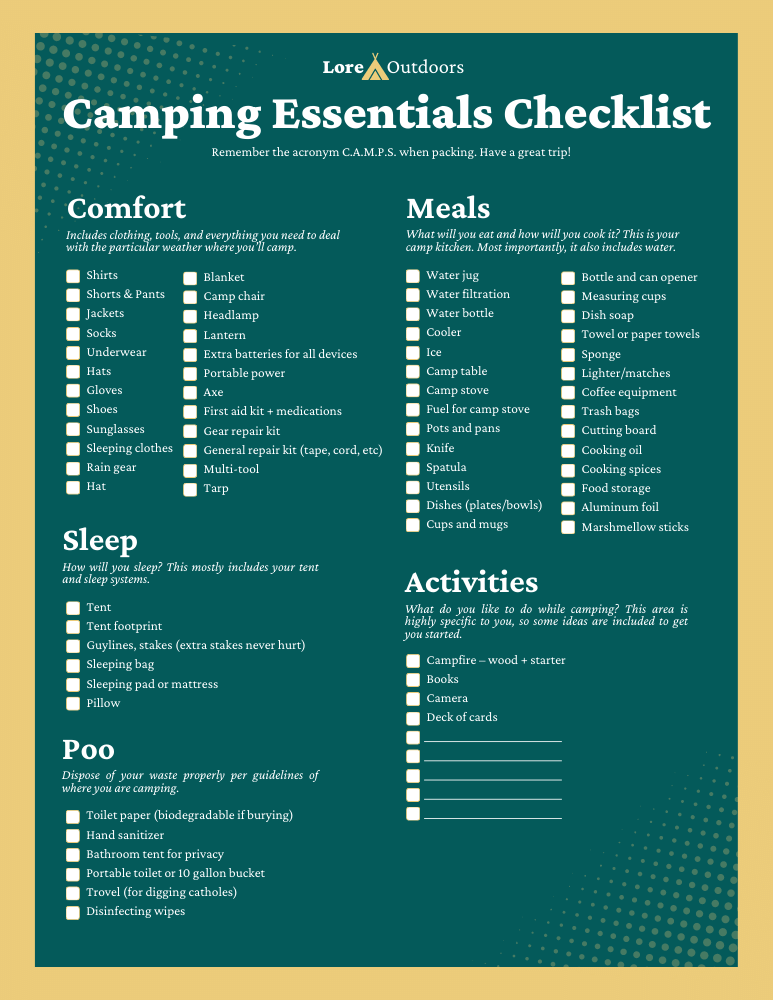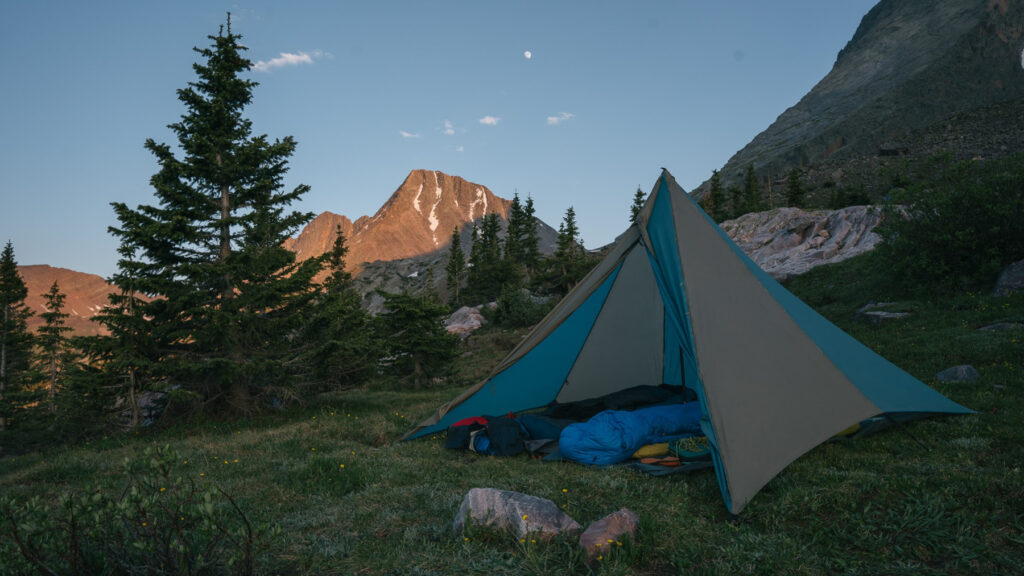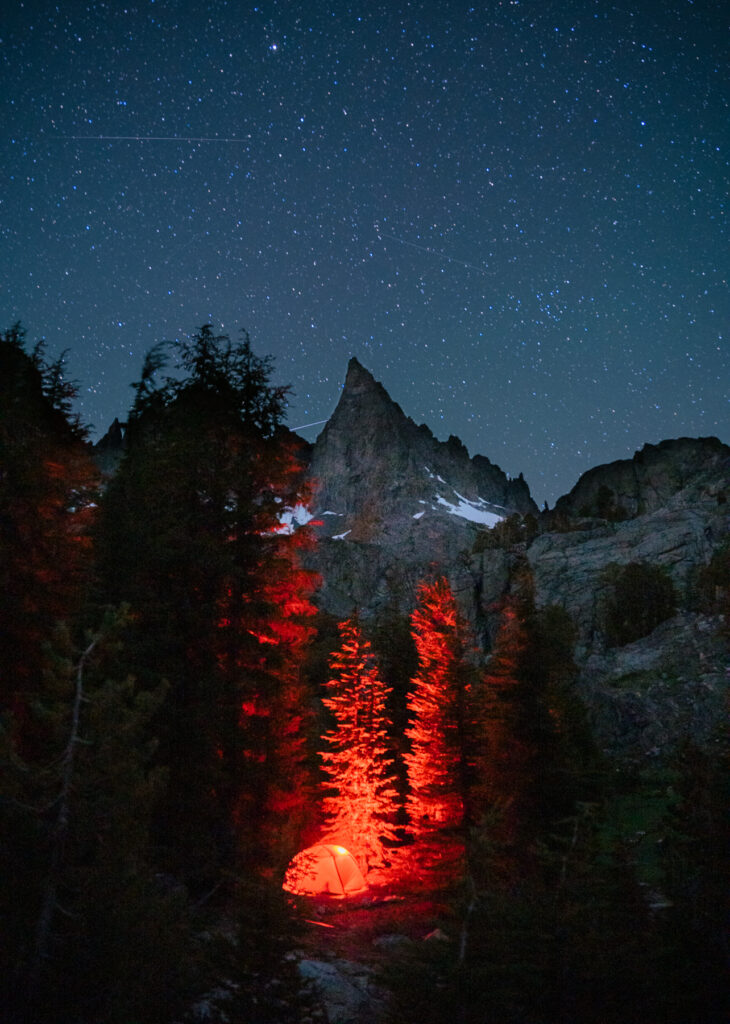I’m a firm believer in solo experiences. Whether it be solo international travel or something as simple as going out to a restaurant by yourself, there is value in solitude. If you’re reading this you’ve likely thought about spending a night out under the stars by yourself.
It’s appealing. The peace and quiet, exploring at your own pace, getting connected with nature. It’s also intimidating. Worrying about animals, or getting injured, or any other manner of fears can quickly shut down any solo camping trip plans. If you’re considering a trip but don’t know where to start, or have stopped yourself from doing it for one reason or another, let this be your push to go.
I think everyone should try camping alone at least once. If you’ll commit to trying it, then I’ve got some tips and ways to help make the most of it for you here. Here’s what I’ll cover:
- Why you should go camping alone
- My top solo camping tips
- Gear checklist for solo camping
- Dealing with loneliness and fear
- Solo camping safety
- What to do while camping alone
Why you should go camping alone

There are all sorts of reasons and ways to camp. Some people like getting deep in the wilderness, some like partying with their friends around the campfire, some like to get away from it all to think about life. I like doing all of those things, but solo camping provides you experiences you can’t get when others are around. It tests you in unique ways, offers deeper relaxation, and an opportunity to let your mind open to either issues you need to work through or just the wonders of the outdoors.
I’ve taken solo camping trips for many reasons. Once I went out to the collegiates in Colorado with my pup for a fall camping trip to shoot photos of the changing leaves and review how I think the year had gone. Another time I camped in the Sierra Nevada solo to explore a new area and hike portions of the PCT. You can make it about the adventure, about reflection, about relaxation if you want. Camping alone lets you do things your way on your own time.
For me that time alone is invaluable. I’m pretty introspective (hence all the writing), so time alone lets me gather my thoughts and look forward. But most of my camping trips aren’t that heavy, many of them simply consist of me going somewhere new, taking my time, and taking photos along the way.
If you’re anything like me, the challenge of solo camping is all about fear. The real battle happens after dark when every sound is amplified 100x and there is less to do. But this is also a benefit because dealing with this discomfort and whatever feelings come up at night in your tent is a powerful experience. You’ll learn a lot, likely lose some sleep, and wake up the next morning better for it. There is just as much value in this as in being able to do whatever you want.
Committing to your first solo trip can be difficult, so lets talk through some ways to make that easier.
My top solo camping tips
I don’t recommend doing what I did, which is go dispersed camping in the wilderness somewhere you’ve never been. While it was incredible, I didn’t make it very easy on myself. If you aren’t scared at all and excited to get after it then feel free to send it like I did, otherwise reducing unknown variables can make everything easier mentally. If this will be your first camping trip ever, check out my beginner’s guide to camping along with this post to get you fully ready. Here are some things I recommend for your first time camping alone:
- Go somewhere familiar—Like I said, reduce unknown variables. Going somewhere you’ve been before feels more comfortable and relaxing. Plus, it gives good vibes if you’ve got good memories there. Why not add a memory to the list by making it your first solo camping spot?
- Have a bail out plan—You should have a backup plan for every trip, but especially when out there alone. Either another possible camp spot, or even the nearest hotel and town if you need services. Don’t leave yourself stranded with no idea of what to do if something goes wrong.
- Trust your gut—Try to stick it out. I lead with this because you’ll likely be uncomfortable at times and thats a part of the experience. If you’re like me your mind will try to come up with reasons to bail. But if something happens that doesn’t feel right, different from healthy anxiousness about the trip, then trust your instincts and get out. Whether that be weather, someone camping around you giving a weird vibe, or anything else. Remember you can always try again another time.
- Arrive during daylight—There’s no sense in trying to setup camp in the dark. Giving yourself some daylight also lets you familiarize yourself with the surrounding area which can provide some peace as night falls.
- Double check your gear—Be more stringent on making sure you have everything when you pack. Don’t stress yourself out by forgetting all your cooking pans and having to make dinner out of your percolator (I say this from experience).
- Know your gear & skills—Don’t just have your gear but know how to use it. Leaving surprises for yourself is just another way to create stress. Dial in your camping skills and know how everything works beforehand.
- Reward yourself/Make it fun—Pack a dessert, your favorite beer, bring your favorite book, a speaker with good tunes, or have a good meal on your way home. Do things specifically to make this a good experience. Remember this is not about forcing yourself through misery. While parts of solo camping may be challenging, it should always be fun.
What to bring solo camping

Use our printer-friendly checklist as a shopping list or packing list for your next camping trip.
Check out our camping essentials checklist for everything you need. Gear doesn’t change when you camp alone, you just have to make sure you have everything instead of splitting responsibility with someone else.
My method for remembering all my gear is the acronym C.A.M.P.S.
- Comfort—Includes clothing, tools, and everything you need to deal with the particular weather during your trip.
- Activities—What do you like to do while camping? I like hiking, reading, and photography so I always have a list of those particular items to bring. Maybe you like music or fly fishing or card games. This area is highly specific to you.
- Meals—What will you eat and how will you cook it? This includes both camp kitchen supplies and cooking ingredients. Most importantly, it also includes water.
- Poo—Everybody
hurtspoos. Depending on where you’re camping your needs for going to the bathroom and general hygiene will vary. Whether its a trovel or just some toilet paper or hand sanitizer, be prepared. - Sleep—This includes your tent and sleep systems, the core of your campsite.
The checklist organizes everything into these groups, and I remember C.A.M.P.S. as a mental check as I pack up the car.
Dealing with loneliness and fear

Let’s talk more about working through any negative feelings that may bubble up while camping alone. It’s natural to feel exposed in your tent alone at night. Worries about animals or other people or weather are bound to cross your mind. I’ve camped alone many times and still deal with the same feelings each time.
One of my first solo camping trips I dealt with these feelings by having one too many beers that night under the guise of relaxation. I love a good beer, but there’s a difference between rewarding yourself and numbing yourself. I don’t recommend using substances as a way to deal with your fear.
Spending time alone without distractions opens up space for anything you may be dealing with, or smothering, to show itself. I see this as a benefit instead of a negative. As things crop up sit with them and view it as an opportunity to learn about yourself. Why are you feeling this way? Where is this coming from?
If this all sounds a bit therapy-esque, well, it’s because nature can have that effect. Nowadays we’re so constantly inundated with stimulus and things clamoring for our attention that we don’t know how to sit with our thoughts. The outdoors provide an excellent forum for this, but we may not alway like what comes to the surface. Part of the game.
Maybe it isn’t that heady for you. Maybe you just don’t want to get eaten by a bear. Great! There are plenty of simple things you can do to reduce any fear or anxiety you feel. Here are a few things that work well for me:
- Look up. The night sky is something else. It’s easy to forget your fear and get lost in the stars. If you have good weather, take your rain fly off your tent and enjoy the view while you fall asleep.
- Set the vibe. I enjoy good books and music to get me in a good mood while camping. Maybe its bringing some lights for your campsite, making the right meal, or a warm drink. Create a positive mood you can sink into.
- Journal. Again, the writer in me is showing. I have a journal I bring everywhere with me and writing can be a great way to pass time if I’m not quite tired yet.
- Don’t overthink it. It’s just a camping trip. Remember that you like doing this (I have to do this often on hard hikes) and there’s a reason you want to be out here.
Just know that feeling some fear, loneliness, or anxiety is a natural instinct. Don’t get caught up in trying to force your way out of it. And yes, it gets easier the more you do this.
Solo camping safety
Even if it just helps you feel more secure, being prepared can help make your trip more enjoyable. There are different ways to approach safety while camping. The first is planning. Have your backup plan ready if something goes wrong, no matter the reason. Knowing how to deal with adverse weather, animals, or other people will give you more confidence as well as help you react correctly.
Weather safety is usually down to gear and backup plans. Know where you’ll go if a storm rolls in and make sure you have the clothing needed to stay warm if its cold.
Animal safety is much more about prevention than actually dealing with a face to face encounter. Setting up your campsite properly is the best thing you can do to prevent unwanted visitors. Separate your cooking area, sleeping area, and car for best effect. 100 feet is the common distance given. Think of your campsite as a triangle with 100 feet between points and choose your spots based on that. Any scented items should be stowed in your car, in a bear canister, or otherwise protected. Never sleep with any food or scented items in your tent.
If you do end up having an encounter with an animal the best thing you can do is know how to handle each. The Alaskans know a thing or two about living with wildlife, and provide some great resources around handling bears and moose. Mountain lions are another animal that, while more rare, are worth knowing about. I’ve encountered bears and moose multiple times without issue.
People safety is the toughest one to deal with, and really the most unfortunate. My number one tip here is to trust your gut. If you have a weird encounter, if anything feels off, get out of there. If it comes to defending yourself, it can be helpful to have items ready you may already have in your camping kit. Bear spray, a knife, and an axe are all items you may have anyway that could be used if needed. Carrying mace can be a great detractor to anyone with bad intentions. I don’t say all this to scare you, most people I know have camped for decades without an issue like this. But something as simple as carrying mace can give you peace of mind whether something happens or not, and that can make your trip more enjoyable.
What to do while camping alone

The best part about solo camping is doing whatever you want. I like to go hiking, shoot photos, read a new book, and write when I’m alone. Maybe you want to make yourself a good meal, or do a creative project, or hell maybe you just want to take a nap in the peace and quiet.
It’s really all up to you when you’re by yourself. Take advantage! If you’re looking for some specific ideas to get you started here are some fun ones:
- Hike a mile from camp in every direction over the course of your trip. Get to know the area
- Photograph your campsite from unique angles
- Try a new recipe on your camp stove
- Write a poem
- Read a book
- Whittle a stick into the shape of a bear
- Perfect your cowboy coffee recipe
- Go fishing
- Learn the constellations in the night sky
- Bring a field guide and identify the flowers and trees around camp
- Journal a description of all the sights and sounds around you
- Take a nap in a hammock
Most of all, don’t overthink it. If you’re interested in solo camping enough to read this you likely already enjoy being outside. Bring some things to do but remember to relax and don’t make it a bigger thing than it needs to be.
Go it alone
I hope this helps you plan that solo trip you’ve been wanting to. If there’s anything missing or if you have any specific questions I can answer feel free to reach out to [email protected]. If you read this and decided to take a solo trip, email me at [email protected]. I always enjoy hearing how folks are getting after it.
Alex Eaton
I'm Alex, the founder of Lore. My life outside started with camping trips in southern Indiana as a kid, and has taken me across the world. My goal is to give you the tools and confidence you need to pursue the outdoor life you want.
Use our printer-friendly checklist as a shopping list or packing list for your next camping trip.